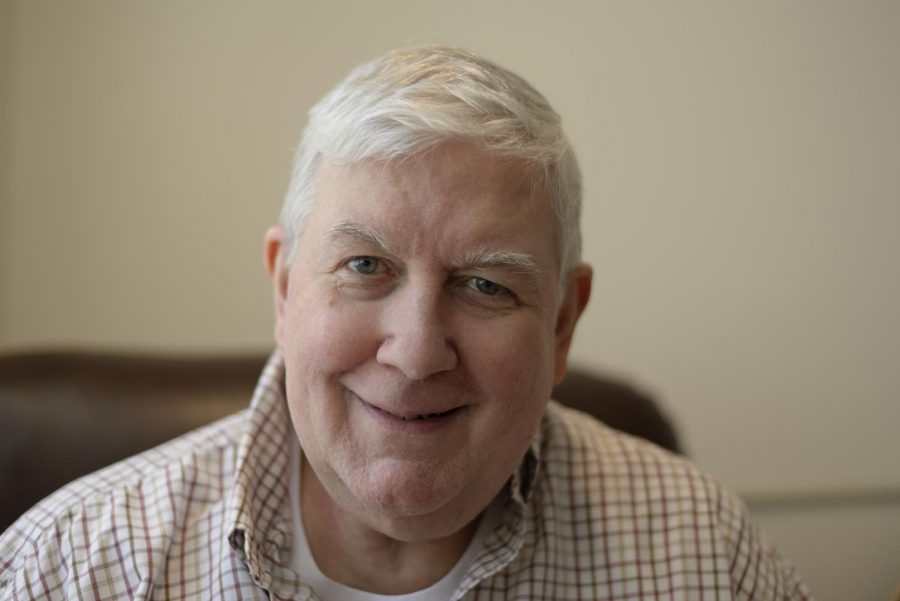Walk On
A former dean led Fordham College at Lincoln Center down a path to prominence; he now has to forge one for himself
NIGEL ZWEIBROCK/THE OBSERVER
Rev. Robert Grimes, S.J., served as dean for 20 years, making him Fordham’s longest serving dean.
May 1, 2019
The longest-serving dean of Fordham College at Lincoln Center, Rev. Robert Grimes, S.J., has held a room in Murray-Weigel Hall twice in his life. Forty years ago, he boarded with several dozen other Jesuits in their mid-20s, studying philosophy at Fordham College (now Fordham College at Rose Hill). Now, in a first-floor apartment with a railing in the hallway, he’s trying to learn how to walk again.
Over the past 20 years, Grimes charted the course for Lincoln Center, packing McMahon Hall with surging numbers of students, streamlining an antiquated curriculum and putting the odd Manhattan enclave of a Bronx university on the map. But over the past year, he has undergone 43 bouts of radiation and numerous MRI and CT scans for prostate cancer, growing weaker with every session.
He’s feeling better now that treatment has ended. Stronger, too. “I wake up and I can pretty much hop out of bed these days,” he said, quickly adding, “I need the walker once I’ve hopped out of bed.”
Grimes does an hour of physical therapy in the afternoon, double the prescribed amount. He climbs the stairs for a little while. Going up is getting easier. Down is the tricky part. He and his therapist then move to the corridor outside his room, stepping slowly with a cane past the doors of retired Jesuits, some decades older than him. Then the cane is taken away, and Grimes has to walk by himself.
It can be frightening on his own, especially going through doors and parts of the hallway without railings. “That’s not unlike what I’ve done in a lot of things in my life,” Grimes said. “I’ve had to do things that I was really scared of over the years, and I mean really scared. And I learned that the only way to do it frequently is to just put it out of your mind.”
When Grimes, first a professor of music, started as dean in 1997, he would repeat a message to himself: “Survive. Always think before you speak and don’t do anything stupid.” He has a postscript now: “Think things out very carefully, but then when you’ve got to do something, you’ve got to do it.”
Grimes’s departure from his position surprised him as much as it did the Lincoln Center campus. “It’s like I left in the middle of the night,” he said. “I’ve gotta get down to Lincoln Center a few times before the new dean comes in, because I don’t think I’ve cleared out all my stuff out of the office down there.”
With projects left unfinished, dreams never realized, Grimes regrets leaving. “If I had my druthers, I’d still be the dean of Fordham College at Lincoln Center,” he said. “If I had my druthers and my health.”
Though his vision for the college is still fresh — even if might not be carried out — Grimes is less sure about his own plans. He’d like to get out of Murray-Weigel Hall, as nice as it is, and move somewhere near Lincoln Center, he said.
He doesn’t suspect he’ll be able to teach at Fordham. Most of his material is 20 years old and playable on cassette, he admitted. But the university currently employs several former Lincoln Center deans. Edward Bristow, Grimes’s predecessor, lectures on two history courses at Lincoln Center and George W. Shea, dean from 1970-85, hosts a class for the College at 60 program.
In his first years in charge, Grimes said he relied on the guidance of the deans still on faculty. For Bristow, he said, “I had his phone number memorized.” With Shea, “he was more sort of moral support.”
Neither Grimes, nor any previous Lincoln Center dean, had a hand in the appointment of the new dean. In fact, he only knew one of the four finalists, he said. The new hire, Laura Auricchio, was an outside prospect from The New School.
He worried that the prospectus, a hiring guide for the dean selection committee, outlined a goal to model Lincoln Center after Rose Hill, although he said he hasn’t read it. “I still think Fordham College at Lincoln Center has a tremendous amount to offer,” Grimes said. “But I hope the university doesn’t get too homogenized.”
Throughout his 20 years as dean, Grimes emphasized Lincoln Center’s distinctive presence in Manhattan. He made it more than a satellite school. He made it a campus.
And now, he is looking back on it, trying to do the same thing he bid the college to do: stand and walk on your own.













